“SEO is dead.”
That’s an easy conclusion to come to after the last few years. Turbulent rankings, increased zero-click searches, and AI-fueled SEO heists feel like the final nails in the search coffin.
The truth is, what actually died is the 2015 version of SEO. It’s no longer just about climbing a list of little blue links on Google. New technology, user behavior, and regulations changed that.
Billions of people still use the internet to search for answers—it just happens in new places and in new ways. SEOs who recalibrate their strategy to meet these opportunities will find plenty of new customers from search.
We’ve reviewed recent data, read through Reddit and LinkedIn, and spoken to SEO experts to bring you the most important SEO trends for 2025. Use them to drive growth from search this year.
Contents
- AI in search results will continue to expand
- Answer engines may become top non-Google traffic sources
- Community search results are here to stay
- Optimizing for sales in SEO will be more important
- First-hand experience becomes a critical SEO trend in 2025
- The shift to user-centric SEO crystalizes
- We’ll need to address zero-click searches
- Saying “SEO is dead” finally dies
The top SEO trends of 2025
Search engines and practices are evolving quickly. But SEO continues to be a top place people go to learn. These are the top SEO trends you should be aware of for 2025.
1. AI in search results will continue to expand
After about a year of optional experimentation, Google unleashed its AI Overviews (AIO) on US results pages in May 2024. The reactions and results—both positive and negative—rolled in rapidly. This year, expect Google to expand its use of AIOs and other generative AI features to more queries.
The appearance of AI Overviews is increasing. In June last year, they showed up in about 7% of searches. By November, that number jumped to nearly 20%. For some informational-intent heavy industries, like business and technology, over a third of SERPs had an AIO.
Google is also testing other applications for AI on SERPs. SERP analyst Sachin Patel showed AI-generated answers he found in the Things to Know feature.

Sachin also posted about an experimental “Get an Explanation” button that pops up when you highlight text in a SERP. Click it, and you’ll get an AI-generated answer in the sidebar.
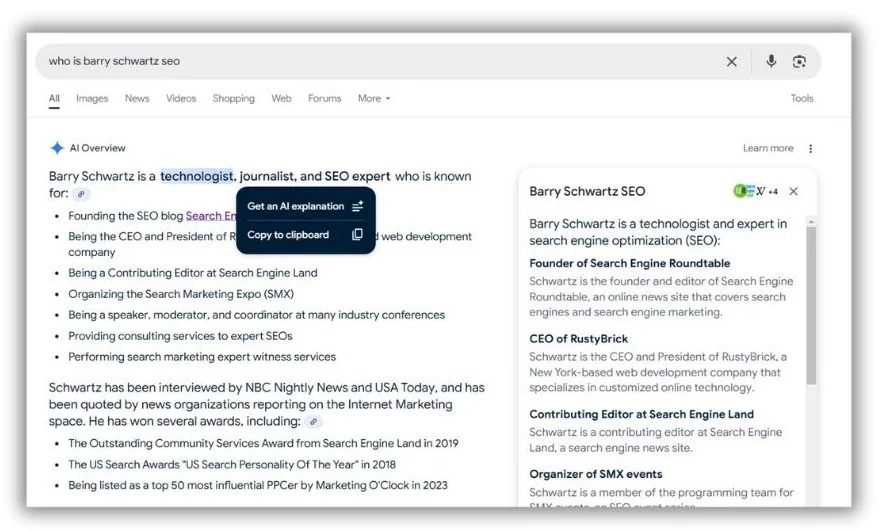
While more AI answers in SERPs will lead to more zero-click searches (we’ll cover that in a bit), they could also have a couple of benefits for SEOs.
First off, Google seems to be reacting to content creators’ pushback by adding more citation links in its AIOs. SEO expert Lily Ray pointed that out recently.
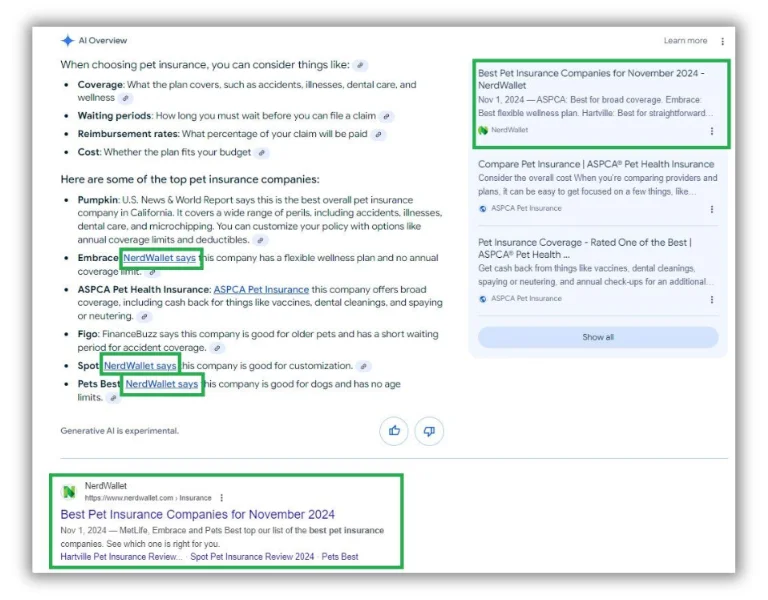
Second, AIOs may present smaller websites a chance at SERP placement they didn’t have before. Semrush’s study found that while the average AIO had 11 citation links, there was only a 20% to 26% overlap between AIO citations and links in the top 10 SERP spots for that query.

This opens up opportunities for websites that may not have a lot of traffic or backlinks to find different placements on the SERP.
Any website hoping to snag an AIO citation still needs excellent, authoritative, and novel content that answers specific questions to do it—which we’ll see infused in several other SEO trends for 2025 (see more AI marketing trends here).
🛑 Keyword research still matters in 2025. Use our Free Keyword Tool to find the terms that matter to your business.
2. Answer engines may become top non-Google traffic sources
We’ve already talked about how AIOs are expanding. But other big AI players are also growing in the search answer engine space, and they’re attracting more search users along the way. That’s driving an uptick in non-Google search referral traffic that will accelerate in 2025.
OpenAI launched ChatGPT search at the end of 2024. It’s already estimated that the AI behemoth will garner 1% of the search market this year. That may be a small slice, but it’s from a very large pie.
Meanwhile, Perplexity, one of the first true answer engines to use up-to-date online information, has amassed over 15 million users. While that pales in comparison to Google’s roughly three billion regular users, it does show a significant quarterly growth trend.

Perplexity places citations prominently at the top of the page, driving its growth in referral traffic.
The big news here is the swift acceleration of referral traffic coming from these two new answer engines. Overall, referral traffic is up 44% from ChatGPT and 71% from Perplexity. One review of a diverse set of websites showed a 145x increase in referral traffic from ChatGPT just since June.
With the carrot of new traffic sources will come the rise of AEO (answer engine optimization). Marketers looking to capitalize will need to know which parts of traditional SEO cross over and which new tactics are required to land a citation in AI-generated answers.
🤖 Free resource: Emergency Guide to AI in Marketing
3. Community search results are an ongoing SEO trend
Heman Patel, senior SEO analyst at LocaliQ, sees online communities as a big focus area for SEOs in 2025. “Community search results are here to stay,” he said. “Google will continue to show search results from forums and communities like Reddit and Quora. Businesses should engage with communities where their customers hang out.”
We saw forums, especially Reddit, get a huge lift from the August core update. That’s when Google really began prioritizing forum content in SERPs. That made Reddit the third most visible website in results pages, quadrupling the traffic it got from Google.
Quora and Reddit results seem to be more prevalent for specific question queries, which makes sense since many of the discussions on those forums answer direct questions.
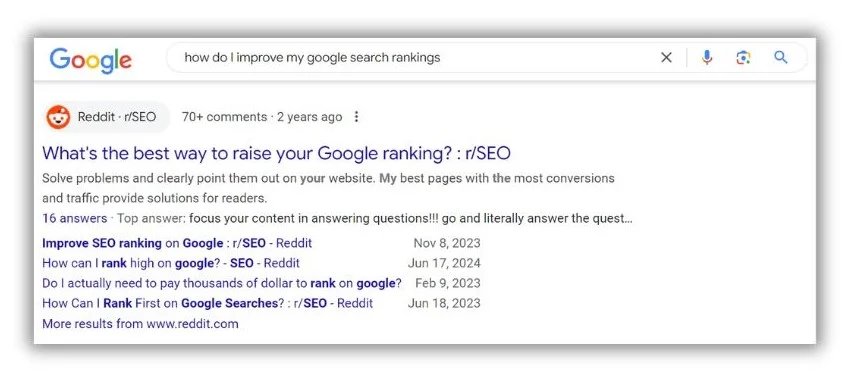
On top of the push from Google, there’s a pull force for forum popularity on SERPs. Google users are appending “Reddit” to their queries. Their goal is to find more genuine, contextual answers from experts.
As a result, marketers have already begun looking for ways to capitalize on the increase of forum content SERP placements.

In 2025, more users will look to forums for answers, especially if they’re put off by AI-generated replies. In turn, expect more marketers to look for ways to attract customers from places like Reddit and Quora. That may be through direct engagement in those forums or by optimizing content and publishing it there.
4. Optimizing for sales becomes more important
Another interesting SEO trend started to emerge towards the end of 2024. SEOs and marketers began talking a lot more about how to optimize down-funnel content for search. So, instead of hyper-focusing on high-level informational content, there is a new push to distribute mid and bottom-of-the-funnel content through search engines.
Sam Dunning, founder of the B2B SEO agency Breaking B2B and host of the Breaking B2B podcast, sees this as a big opportunity in the coming year. “Optimising for search and sales so content enables your sales team by leveraging customer research, questions, and objections from sales calls is important. That way, it not only ranks but also resonates, builds trust, and converts clients.”
A study of 50 brands from Seoworks suggests that Google may actually favor websites with a high percentage of branded content.
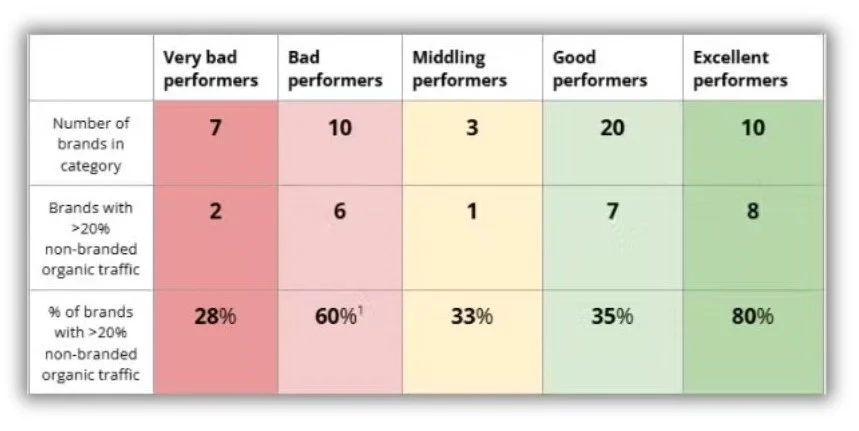
So, there doesn’t seem to be a negative to adding a little product or brand promotion to your SEO content. “You’ll want to weave in ‘a-ha’ moments of product into articles that you hope to drive leads and revenue from,” Sam said. “For example, add video, gifs, and demos so content can sell for you.”
Sam also mentioned that brands driving the most pipeline revenue from SEO are the ones who “quickly identify and approve money bottom-funnel keywords.”
Andrew Holland, director of SEO at JBH, wrote about why “SEO content needs a business-first mindset.”
That means, “When you create content for SEO, it must always be linked to business goals. Because sadly, there is way too much content in SEO that was created for traffic as a vanity metric,” Andrew said.
We’re seeing more pros share how they use SEO to convert customers, not just attract them. For example, this article by copywriter Tasmin Lofthouse on the Moz blog explains how to use “Emotional SEO” to increase your sales.
While marketers may be on edge about a potential drop in organic search traffic, it’s clear they’re thinking about how to shorten the journey buyers take from SERPs to purchase. If these early trials net more customers faster, you can bet we’ll see more sales copy find its way into SEO content.
5. First-hand experience becomes a critical SEO trend in 2025
For years, Google has called out the need to bake first-hand experience and expertise into SEO content. But the prevalence of AI-generated content and users’ search for authenticity have made those qualities critical for anyone trying to rank content in 2025 and beyond.
Google claimed that experience, expertise, authority, and trust (E-E-A-T) were at the center of its quality rater guidelines—the rules its human reviewers use to qualify good content. The Google API leak that circulated in 2024 referenced “OriginalContentScore” as a ranking factor. This means Google does indeed consider how novel the information on a webpage is before deciding where to place it in the SERPs.
Like we mentioned before, users are also turning to forums for more original content filled with personal experiences and expert input. Marketers who attempt to flood SERPs with AI-only content won’t rank in the long term. It’s brands that can mine their internal data, expert network, and user surveys for new ideas that will rise in the rankings in 2025.
What does this elevated experiential content look like? Here’s how Tim Soulo, CMO at Ahrefs, describes “Great content” in a LinkedIn post.
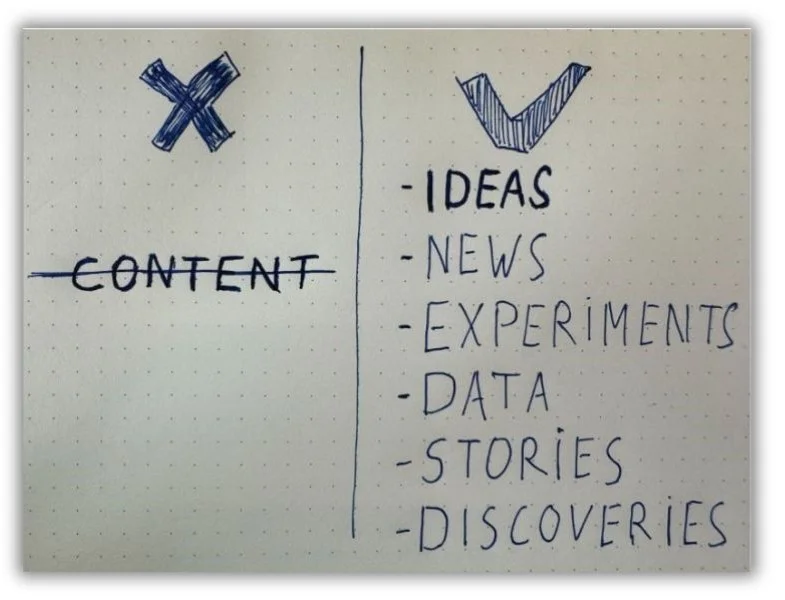
Tim actually suggests dropping the word “content” altogether and focusing on the ways you generate information that no other source can provide.
Brooklin Nash, co-founder of Beam Content, also wrote about the need to refocus on the value of subject-matter expert interviews. He said, “Nothing in content marketing beats 45 minutes with an SME (except for maybe original benchmark data).”
If brands want to stand out in 2025, Brooklin said they need to start laying the groundwork with SMEs now. He added that your SMEs can come from your internal pool of experts, your C-suite, customers, and external influencers, to name a few.
No matter how it’s done, look for experiential content to be a growing SEO trend in 2025.
6. The shift to user-centric SEO crystalizes
Another important SEO trend for 2025 is the shift from keyword-focused optimization to user-focused optimization. In other words, we’ll need to address intent and answer the granular questions users now ask instead of highly optimizing for one specific keyword.
Consider this: Only 5.4% of Google AIOs contained an exact query match in one large-scale study. That’s not a surprise since one of AI’s superpowers is understanding the context of natural language. But since AIOs are a bellwether for search as a whole, it’s a point of proof that, more than ever, SEO needs to focus on user intent over exact phrase matching.

Surferseo used this example to show that intent, not keyword matching, matters more now.
The Google API leak and what we learned from the Google antitrust trial backed this up. Specifically, we saw that Google’s Navboost system considers not just click count but a variety of click types, like:
- badClicks
- goodClicks
- lastLongestClicks
- unsquashedClicks
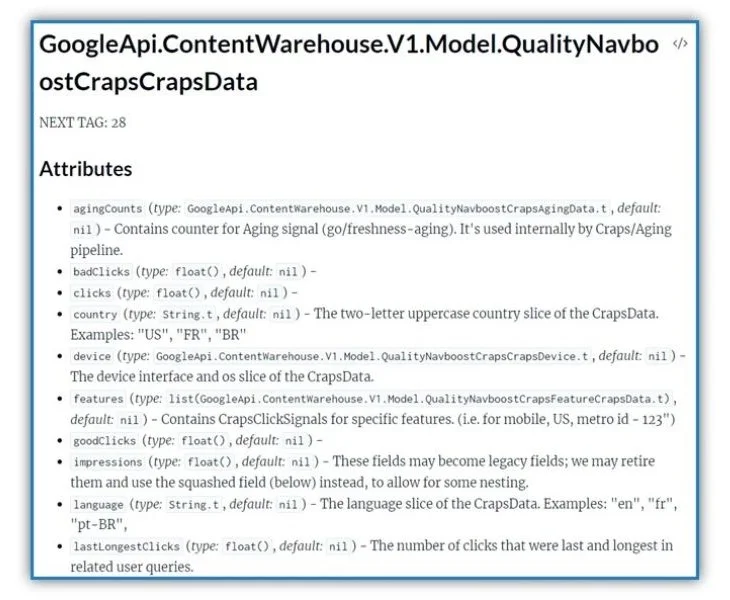
This means Google cares about how its users engage with your content, not just if they click into it, which brings us back to meeting the real intent of a search, not just matching a keyword.
Now, consider how AI chatbots and answer engines provide information. They’re like Google’s featured snippet on steroids. You’ll need to provide more concise answers to granular questions to get cited in Google’s AIOs (and other answer engines).
Bernard Huang provided an interesting perspective here. He suggests that “Ranch Style” SEO content is the replacement of the old skyscraper post. Instead of creating one giant asset that ticks all the keyword boxes, SEOs should produce several shorter, more focused pieces that interlink.
Bernard said each of those pieces should include some experience and information others don’t.
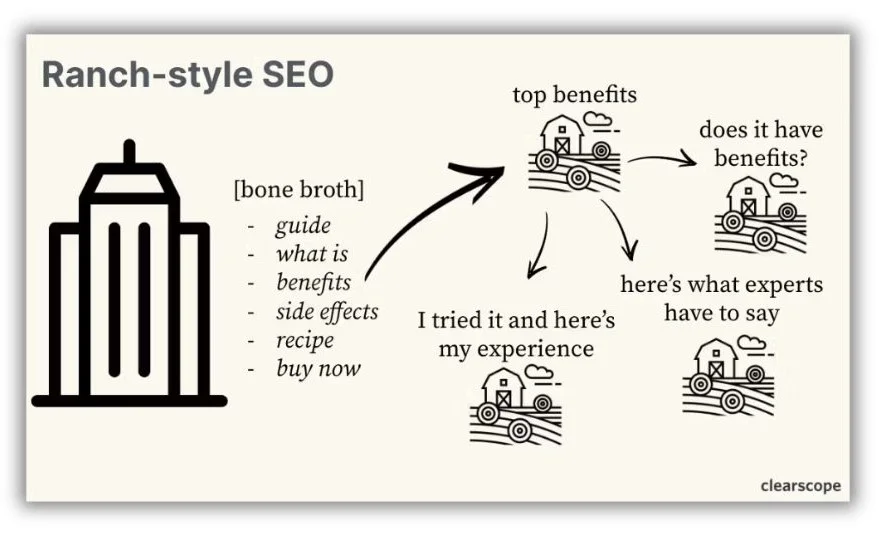
As we move deeper into 2025, we’ll learn even more about which types of content are successful for both SEO and AEO. But the trends suggest that over-focusing on keywords is out while user and intent focuses are in.
7. We’ll need to address zero-click searches
The threat of zero-click searches has loomed large since Google first rolled out featured snippets. We’ll likely see them become a bigger portion of searches this year. Marketers who currently rely on search traffic for growth will need to account for this new reality in their 2025 strategy.
In July of 2024, Rand Fishkin reviewed clickstream data for Google users. He found that just over 41% of US searches ended up in a click. However, once you remove clicks going to Google-owned properties (e.g., Google Flights), only 360 of every 1,000 searches resulted in a click to open the web.

It’s important to note that this data confirms an upward trend. A 2022 study showed that zero-click results made up just a quarter of all searches.
Could this be the effect of AIOs? Probably not, since AIOs weren’t showing up in a ton of searches in July. But that doesn’t mean they won’t have an effect in the future. Search Engine Land speculated an increase in overall searches but a decrease in referral traffic due to AIOs. The jury’s still out, but if AIOs have any effect, it’ll be to increase zero-click searches, not decrease them.
The growth of answer engines and the increasing use of social media sites as search platforms add to the zero-click trend. Perplexity, LinkedIn, Facebook, etc., work hard to keep users from clicking away from their platforms.
There are still plenty of organic clicks to be had (even 30% of billions of searches is a lot). But we are also finally at a place where we can’t ignore zero-click searches. That means in 2025, we’ll all need some zero-click search strategies in our marketing plan.
8. Saying “SEO is dead” finally dies
For years, we’ve heard the chorus that adaptations like zero-click searches and evolving algorithms would be the death of SEO. The data proves otherwise, and the tune is finally changing. Leading voices point out that search is thriving—it just looks different and is happening in other places.
Neil Patel Digital recently ran a test on 30,000 websites. The results? Organic traffic increased despite the prevalence of AI Overviews.

To be fair, many solid websites have lost a chunk of their organic search traffic, so it’s a trend we can’t ignore. But even if that continues, search offers other benefits—like brand awareness and traffic from other sources—that will continue to make it a viable marketing strategy.
Here’s how Rob May, Senior SEO Manager at DNSnetworks, put it in a recent LinkedIn comment.

In 2025, We’ll see SEOs recalibrating to take advantage of these opportunities. That’ll include some of the tactics we’ve covered, like AEO, as well as social media SEO and new measurements around awareness and conversions instead of just traffic.
Stay on top of SEO trends in 2025
You can’t have growth without change. So as search evolves into its full multi-channel, AI-powered reality, we’ll need to adjust our goals and strategies to meet it…or miss out on the opportunities 2025’s version of SEO offers.
SEO isn’t the only thing evolving. Follow these other marketing trends for growth in 2025:
- 10 Key Insights to Inform Your Marketing Plans in 2025
- How to Thrive in 2025: 10 Marketing Pros Give Their Top Tips
- The Big Small Business Marketing Trends Report for 2025
- The Top 7 Content Marketing Trends for 2025 (+How to Prepare for Each)
- The Top Google Ads Trends for 2025 (+How to Take Action Now!)
- SEO Stats to Reference Everywhere in 2025







